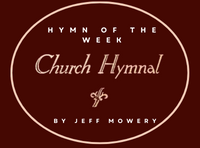As With Gladness Men of Old
As with gladness, men of old, did the guiding star behold
As with joy they hailed its light, leading onward, beaming bright
So, most glorious Lord, may we, evermore, be led to Thee.
As with joyful steps they sped to that lowly manger bed
There to bend the knee before Him whom Heaven and earth adore;
So may we with willing feet ever seek Thy mercy seat.
As they offered gifts most rare at that manger rude and bare;
So may we with holy joy, Pure and free from sin’s alloy,
All our costliest treasures bring, Christ, to Thee, our heavenly King.
Holy Jesus, every day, keep us in the narrow way;
And, when earthly things are past, Bring our ransomed souls at last
Where they need no star to guide, Where no clouds Thy glory hide.
In the heavenly country bright, Need they no created light;
Thou it’s Light, it’s Joy, it’s Crown, Thou it’s Sun which goes not down;
There forever may we sing Alleluias to our King!
I referenced this particular song in the “Hymn of the week” last week – What Child is this? It was written by the same author, William Dix, and is often used to celebrate a time during the Christian calendar called “Epiphany.” This time goes from January 6th through Ash Wednesday, and was chosen to remember the time when the wise men first encountered the Christ-child. It is also used as a Christmas carol, but is not as well-known as many other carols. What I like about this hymn is that it is a prayer – a prayer that we might have the same kind of attitude these men had. It also challenges us to do some of the same things that they did. They offered valuable, meaningful gifts to the Lord. They followed God’s leading. They had an attitude of expectation, joy, and gladness. This hymn reminds us that we should do the same.
Couple of phrases worth spending some time on:
- “willing feet, ever seek Thy mercy seat” – The mercy seat is described in Exodus Chapter 25. It was part of the ark of the covenant and kept in the Holy of Holies. I find it interesting that the author refers to “willing feet” seeking the mercy seat. I would guess that the High priest of the Old Testament approached the mercy seat reverently, or maybe even hesitantly at times, and definitely with a sense of fear. I don’t know about them approaching it “willingly.” For those who approached God and the Holy of Holies with an unholy attitude, they would have been struck dead. Here the author reminds us to approach willingly. Part of me thinks that means that we approach with “boldness” because we have been redeemed. Hebrews 4:16 reminds us “Let us therefore come boldly unto the throne of grace, that we may obtain mercy, and find grace to help in time of need.” I also think to approach willingly means we approach because we know that in that seat of mercy, we too find mercy. We have found, and continue to find, forgiveness and mercy from God.
- “Pure and free from sin’s alloy” – To be honest, I wasn’t sure exactly what this phrase meant when I read it. I have heard of an alloy in regard to metal. An alloy is the combination of two or more metals with a non-metal. However, the word “alloy” can also mean “a less costly metal mixed with a more valuable one,” or “anything added that serves to reduce quality or purity.” The author’s choice of words then jumps to life for me. As wise children of God, shouldn’t we live lives pure and free from sin’s alloy – free from the things that reduces our quality or purity? Aren’t we to be refined as pure gold? The question is are we more like alloys – a mixture of God’s grace combined with an unholy lifestyle? What a challenging and convicting thought this becomes when you dive into the meaning of this phrase!
If you are like me, you probably have a fairly good understanding of a couple of the gifts the wise men brought to Jesus. Gold is an easy one to comprehend. Just watch TV and you will see “Cash for Gold” commercials. We understand gold’s beauty and value even today. Frankincense – a little more difficult, but most of us have probably smelled incense before, so we have some understanding of the concept. Incense was used by the priests as part of the sacrificial system in the Old Testament, and often it represented worship or praise going up to the Lord. I feel like I have a decent understanding of this gift as well. However, if you are like me, I didn’t know anything about myrrh. While reading a Bible commentary recently about the wise men and their gifts, I came across some interesting facts about myrrh that I wanted to share.
Myrrh comes from a small tree that resembles a thorny bush, and can be used in perfumes or incense. Myrrh gives out a fragrant smell when crushed. According to the resource I have, the process of obtaining myrrh is as follows: (a) the “skin” or the bark of the plant is “pierced” so that the plant will “bleed” a white gum, (b) the white gum turns red on contact with the air, and then becomes what we know as myrrh. Wow! Thorny bush – Crown of thorns. Fragrant smell when crushed – Jesus’ sacrifice was the most “fragrant” that had ever been given. The skin of the tree has to be pierced – Jesus’ body was pierced with lashes, and His side was pierced with the sword. Myrrh exudes as white then turns red – the spotless Lamb was covered in blood for the remission of sin.
Once again, certain aspects of the Christmas story (Christ’s advent) point to the ultimate purpose for His coming – His atoning sacrifice and resurrection. I believe the wise men, under the leading of the Holy Spirit, brought gifts to recognize who Jesus was. Gold to represent that He is the King of Kings. Frankincense as a reminder that we are to worship Him as God. And Myrrh to point to the fact that He would be, as the prophets foretold, the Suffering Savior. Powerful truths found in these simple gifts that we often times overlook.
May our gifts to the Lord be far greater in value than the gifts we give one another this Christmas season, and may God bless you this Christmas season.

